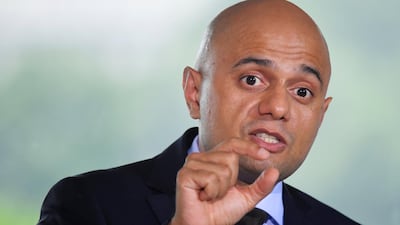Often portrayed as a self-made man, state-school-educated home secretary Sajid Javid has risen fast through the Conservative Party ranks to become a leadership contender.
Mr Javid declared his intention to run for leader of the Conservative Party and, therefore, Prime Minister on Friday.
Raised from humble beginnings, Mr Javid’s Pakistani parents came to the UK in 1961, where his father worked as a bus driver in Rotherham before setting up his clothing business, Scallywags, in Bristol.
The 49-year-old is the middle sibling of five high-flying Javid children. His brother Basit is the Chief Superintendent of the West Midlands police; Atif is a property entrepreneur and Khalid is the founder of property finance firm Blackstone Financial Solutions.
Tragedy struck the family in September last year when eldest brother Tariq, 52, was found dead in a Sussex hotel having taken his own life. Tariq had been a successful retail entrepreneur.
Mr Javid has spoken of his personal memories of racial abuse as a child, brought to the forefront of his mind when a video of a Syrian child being beaten up in the UK hit the headlines last year.
“I was in the school playground when someone tapped me on the shoulder. I turned around and got a punch in the face and called a ‘P*** b******,’” he said. “As a child I remember thinking: ‘what’s wrong with me?’”
If elected, he will become the first prime minister from an ethnic minority background.
Mr Javid acknowledges his “Muslim heritage” but does not currently practise a religion. He has said he believes a Muslim could become Prime Minister in the future.
"I think in Britain anyone who’s capable, regardless of whether they’re Muslim or Hindu, for that matter, or any other religion or no religion, can be prime minister," he said earlier this month.
Despite challenges in the playground and elsewhere growing up, Mr Javid graduated from Exeter University with a degree in Economics and Politics in 1991 - the first of his family to attend university. During his studies he got his first taste of electoral victory, becoming the First Year Representative to the Guild of Students Council. He also ran the university's Conservative Association.
“It was the first time I fought for votes and convinced people to back me. I learnt valuable lessons then which I still use today,” he told the university’s alumni magazine.
From there he began a stratospheric course to the upper echelons of the financial sector, starting with a spell at New York’s Chase Manhattan bank. On his return to the UK, he built a career at Deutsche Bank, rising to the board of directors- and making millions in the process.
At the very beginnings of his career, he met now-wife Laura during a summer placement at the Commercial Union in Bristol. The couple have four children who are privately educated.
In 2010 Mr Javid left his financial career for politics, winning a seat as a Conservative MP in Bromsgrove in the West Midlands, which he has represented ever since.
"I readily admit that being seen as an investment banker was not the most useful thing on the campaign trail," he said in his maiden speech. "But it helped prepare me for a profession not well liked by the general public."
Mr Javid rose through the ranks quickly within the 2010 David Cameron government. Just two years after his election he served as a junior Treasury secretary, progressing through various roles to lead the department of culture in 2014, Department of Business in May 2015, Communities and local government in 2016 and Housing in January 2018.
Mr Javid began his biggest appointment yet in April 2018 when he took over the post of home secretary from Amber Rudd, who admitted “inadvertently” misleading MPs over targets for deporting illegal immigrants.
As home secretary Mr Javid has been tough on immigration and extremism. He is currently mulling a ban on British citizens travelling to Syria and parts of West Africa under terrorism legislation and has invested £346,000 into projects to combat hate crimes and protect victims.
As housing minister he was criticised for breaking a promise to the Grenfell fire survivors to rehome them within a year of the tragedy - many are still without permanent accommodation.


